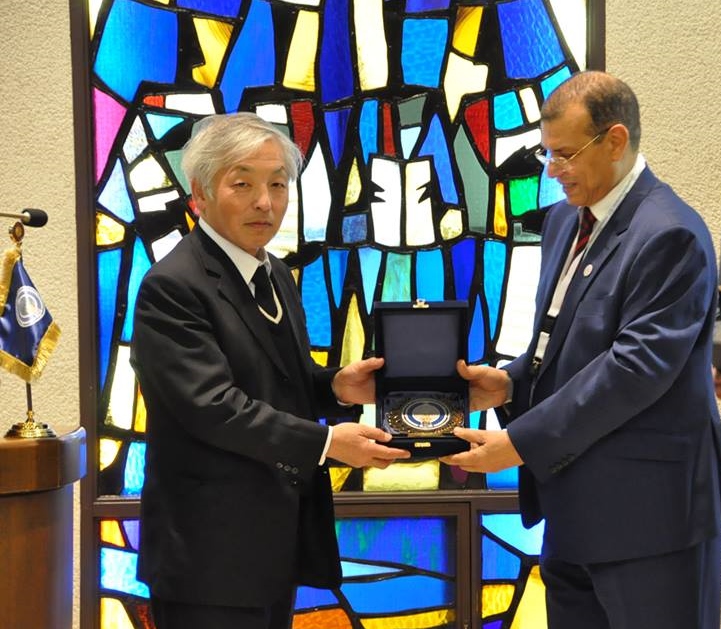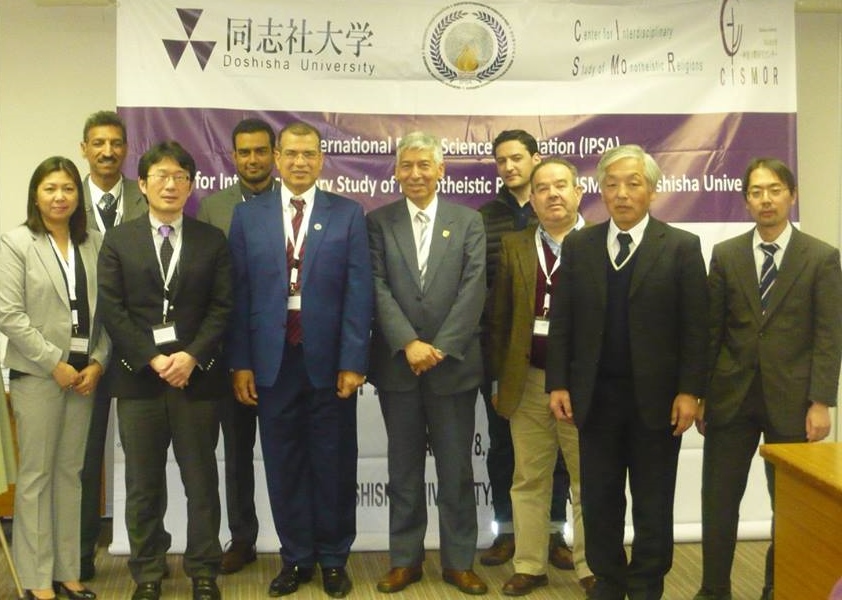Center for Interdisciplinary Study of Monotheistic Religions(CISMOR)Doshisha University
> Public Lectures > International Conference “Police, Internal Security and community”Public Lectures
International Conference “Police, Internal Security and community”
| Date: |
2016/03/18 10:30-18:00 |
|---|---|
| Place: |
Workshop: Meeting Room, the 3rd floor of the Shiseikan. Public Lecture: Divinity Hall Chapel |
| Lecture: |
Wrokshop: 1.MS. MICHELE GREGORIO(Exective Manager -IPSA) 2.MR. IKUYA YOSHIMURA (Representative Director - Glocal Vision, Inc., Former National Police Agency Foreign Affairs and Intelligence Department International Counter-Terrorism Division Deputy Director) 3.MR. TORES SMITH(Regional Board Member - American Region, IPSA) 4.Dr. NAOFUMI MIYASAKA (Professor - National Defence Academy) 5.DR. MUSAED AL NAJJAR(Regional Board Member - Asian region, IPSA) 6.DR. MOHAMMED OUDAIMAH (Lecturer - University of Tokyo) 7.MR. SAMEER ABDELMOTTLEP(Police Officer - Los Angeles Police Department)) Public Lecture: Dr. Mamdooh A.Abdelmottlep Executive Chairman of IPSA (International Police Science Association), Sharjah, UAE |
| Summary: | |
|
Dr. Abdelmottlep comparatively analyzed terrorist attacks and violent crimes, such as murder, and discussed the differences in the motives of the two crimes. It is difficult to academically consider international terrorism. This is because there are nearly 250 different definitions of terrorism, as there is no internationally standardized definition. However, some points can be derived from the differing definitions. In essence, terrorism is a violent act that is used for various purposes, such as propaganda. Background factors, such as political, social, and ideological factors, have been identified. The goal of terrorists is to create the maximum effect of terrorism, by making people afraid and anxious. Phenomenonally, it is generally consistent as a violent, extreme, and radical act. According to a statistical analysis of terrorism, terrorist acts are overwhelmingly conducted in the Middle East. Furthermore, approximately 70% of victims are government officials. In 2015, the incidence increased by 80% in comparison with the previous year. However, a comparison of the number of victims of ordinary murder or bodily harm and that of terrorist attacks revealed that terrorism-related victims were fewer; therefore, acts of terrorism cannot be said to be the most dangerous for society. Boko Haram, a Nigeria-based international terrorist organization, was responsible for 77% of attacks globally in 2015. In comparison with this, the number of terrorist acts of IS or other organizations was small, but the media more regularly broadcasts IS activities, giving IS a higher degree of international influence. Furthermore, 92% of terrorist acts were political in nature. Current terrorism has been called fourth-generation warfare, and has frequently occurred in Yemen, Syria, Iraq, Nigeria, and Afghanistan. An investigation of approximately 2,000 persons who were involved in terrorism or were arrested in connection with it revealed that the subjects were primarily men of various nationalities and races who had no personality disorders, had received an education, and had a job: poverty was not the cause of acts of terrorism. Most were Muslims who did not have a balanced understanding of Islam. They were drawn to the group via information broadcast through various media. The primary motivations for committing acts of terrorism were as follows: 1) returnees from the recent Afghan war, 2) those in search of their own identity, 3) those who joined for financial reasons, feeling it to be financially attractive to join IS due to the perceived wealth of the organization, and 4) persons who joined to obtain employment. In essence, they did not join IS because they dogmatically or ideologically adhered to Islamic fundamentalism. In addition, no studies to date have proved a strong relationship between political refugees and terrorist acts. The economic burden on governments regarding counter-terrorism is not in any way abnormally high in comparison with the cost of countermeasures for ordinary crimes. Regarding the targets of terrorism, religion-related targets were extremely few, and the most common target was private property, followed by military, police, and economic facilities. There are studies that report that when persons who have participated in terrorist organizations return to their home countries and receive poor treatment, they return to terrorism. Countries such as Saudi Arabia conduct awareness education and offer guidance to persons who have so returned. The UAE has undertaken two types of countermeasures: response to actual terrorist attacks and general countermeasures. International and collective countermeasures must be taken to combat terrorism, and such countermeasures must take into account the entire picture in an integrated way. Furthermore, tolerance, fairness, and co-existence are also countermeasures. Anti-terrorism strategic policies must fulfill the four elements of international cooperation: legal support, financial support, the recognition of cultural value, and enlightenment. Moreover, it is important that international cooperation and coordination of responses to future terrorist attacks are carefully devised . Following the conclusion of the lecture, Dr. Samir Nouh provided some comments, and a question and answer session was conducted for the participants. Tomoki Asaka Postdoctral Fellow, CISMOR |
|
|
Organizer: IPSA, CISMOR Co-organizer: School of Theology, Doshisha University |
|
|
20160318 Program 20160318 Open Lecture poster |
|

